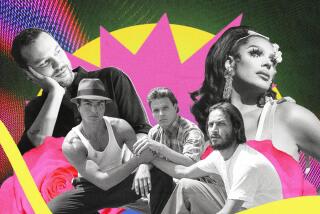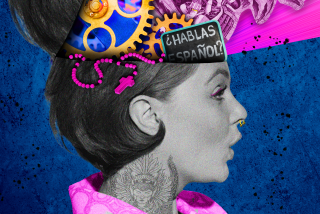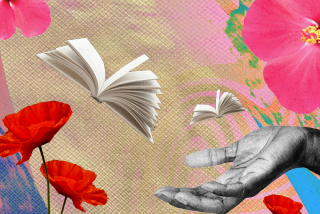Book review: ‘The FSG Book of Twentieth-Century Latin American Poetry’
The FSG Book of Twentieth-Century Latin American Poetry
An Anthology
Edited by Ilan Stavans
Farrar, Straus & Giroux: 729 pp., $50
Here’s the answer to a hypothetical “Jeopardy” query: “Who are Pablo Neruda and, um…?”
And now, the question: “Which modern Latin American poets could an average U.S. reader likely name without using Google?” No fair if you’re counting Ricky Martin, by the way.
Until fairly recently, that would’ve been my own blushing response. For five years I lived in Mexico City and worked in an office near a beautiful, leafy street named for Rubén Darío, the great Nicaraguan journalist, cultural diplomat and poet. Darío’s admiration for the French Symbolists, along with his wariness toward the geopolitical adventurism of Uncle Sam, propelled him, almost single-handedly, to haul Latin American verse into the 20th century under the battle flag of the “Modernismo” movement.
Yet, despite my inspirational environs, for many years my knowledge of Latin American poetry was limited to a handful of stalwarts like Neruda, the nonpareil of romantic yearning, and his compatriot and fellow Nobel Prize-winner Gabriela Mistral. Some poets I’d known better as political prophets and provocateurs than as verse-makers (José Martí, Ernesto Cardenal, Roque Dalton). I’d read and re-read the brilliant, book-length essays of Octavio Paz (yet another Nobel recipient) but was far less acquainted with his poetry, drawn not only from the deep cenotes, or sinkholes, of Mesoamerican mythology but also from his scholarly immersion in Sanskrit, Japanese haiku and whatever else his elegant mind alighted on.
For that reason, among others, I’m grateful for the publication of “The FSG Book of Twentieth-Century Latin American Poetry,” which thoughtfully gathers selected works of these relatively familiar names, along with many deserving lesser-known ones. Handsomely printed and designed, the collection has been astutely edited by Ilan Stavans, the prolific author and Amherst College professor who has done as much as anyone alive to bridge the hemisphere’s linguistic gaps, and it boasts an all-star lineup of translators. In addition to Stavans they include W.S. Merwin, Richard Wilbur, Lysander Kemp, James Merrill, Robert Bly, Samuel Beckett and Ursula K. Le Guin. Many of the English-language versions that appear here, alongside the originals, are as good as we’re likely to get for some time, perhaps ever.
Most significantly, this hefty volume shows the ethno-linguistic breadth of what we lump under the monolithic term “Latin American” poetry. Like Walt Whitman’s poetic Self, the bards of Latin America “contain multitudes.” This volume includes works originally written not only in Spanish and Portuguese, but also in French, slangy Caribbean patois (for example, Nicolás Guillén’s wonderful “Brief Ode to a Black Cuban Boxer”) and indigenous tongues, such as the Nahuatl of Mexican poet Natalio Hernández Xocoyotzin and the Mapuche of the Chilean Elicura Chihuailaf. (What is it about Chile and its production of great poets: Mistral, Neruda, Nicanor Parra, Chihuailaf and on? Does the dramatic convergence of northern desert, southern glacier and Andean peaks create a parallel tectonic collision of lyrical thought? Has the country’s remoteness and sparse population made it a refuge of quiet contemplation?)
One way of looking at how Latin American poetry evolved between the late 1800s and the post-World War II era is in terms of how it was shaped by Great Power spheres of cultural influence as Spain gave way to France, which in turn gave way to the United States — not only the U.S. of Whitman, Emily Dickinson and Allen Ginsberg, but of Teddy Roosevelt and the Bay of Pigs.
As the last remnants of the Spanish Empire crumbled in the 1890s, many Latin American writers, composers and artists turned to Paris, then the world’s cultural capital. Darío, in particular, became the standard-bearer of a new style of cosmopolitan hemispheric literature, and other poets also embraced the French aesthetic and transformed it into Latin American “Modernismo.”
Martí’s “Love In the Big City” owes an obvious debt to Baudelaire: “It is an age of dry lips!/Of undreaming nights! Of life crushed unripe!” the Cuban laments. While Baudelaire often seems about to choke on his own bile, Martí’s aftertaste is decidedly bittersweet. His tart observations and spiritual ennui are made palatable by the passionate fecundity of his imagery.
Stavans coins the term “Menardismo” to describe the “spongelike quality” of post-Modernista Latin American poetry, its capacity for assimilating and reshaping other cultures so as to make them “acquire a new authenticity.” His reference is to the short story “Pierre Menard, Author of the Quixote” by Argentine Jorge Luis Borges, who is represented here by a half-dozen poems, including “The Cyclical Night,” a lovely rumination about mankind’s infinite capacity for star-struck gazing at the timeless cosmos.
Cultural exchange is always a two-way street, of course, and this collection brims with wonderful examples of surprising affinities between Latin American and U.S.-European sensibilities. Beckett’s take on “And Thou, Expectant…” by Mexican poet Amado Nervo (1870-1919) is a Catholic-existentialist gasp of wonder at Creation, tinged with some frustration at a God who withholds His divine purposes: “Señor, cuando veremos la rosa abierta!” (Lord, when shall we behold the open rose!)
In their exhilarating version of Darío’s “Love Your Rhythm…,” Greg Simon and Steven F. White render “eres un universo de universos/y tu alma una fuente de canciones” as “You’re a cosmos in a cosmos set free./Be the fountain of songs that your soul needs.” The addition of the phrase “set free” (not in the literal Spanish) both preserves the meter and underscores the poem’s imperative tone, reminiscent of Rainer Maria Rilke’s famous exhortation (“You must change your life”) in “Torso of an Archaic Apollo.”
Andrew Rosing replaces dry historical abstraction with pulsating, visceral imagery in his translation of José Santos Chocano’s “A Manifesto,” in which “Mi fantasia viene de un abolengo moro [Moorish ancestry]” is changed to “My imagination comes from ancient Moorish blood.” That provides a better setup to the concluding thought that “the Andes are of silver, but Leon is of gold;/I fuse both races with a noise like thunder.” And Le Guin magnificently transmits the otherworldliness of Mistral’s enigmatic “The Sleep-Wave” and “Airflower,” which make the Cono Sur seem as dreamily alien a landscape as the far side of the moon.
A nit-picker might wish that the volume gave the actual dates of the poems, rather than just the poets’ life spans. Also, the youngest writers included here were born in 1962. Surely there must be one or two poets between Tijuana and Tierra del Fuego who are not yet pushing 50 and worthy of inclusion.
Over the decades, many Latin American poets have attained not only a stature but a role in public life, a seat at the national conversation. Cardenal, a trained priest and liberation theologian, was culture minister for Nicaragua’s Sandinista government before becoming one of its fiercest critics. Paz served as his country’s ambassador to India and resigned in protest of a Mexican government-sanctioned massacre of protesters in 1968. Mexico’s Homero Aridjis, whose lovely poem “El Ojo de la Ballena” (The Eye of the Whale) appears here, also is a diplomat and leading environmental activist.
Poetry in Latin America is still serious business and, as this fine collection reminds us, valued sustenance.
More to Read
The biggest entertainment stories
Get our big stories about Hollywood, film, television, music, arts, culture and more right in your inbox as soon as they publish.
You may occasionally receive promotional content from the Los Angeles Times.







